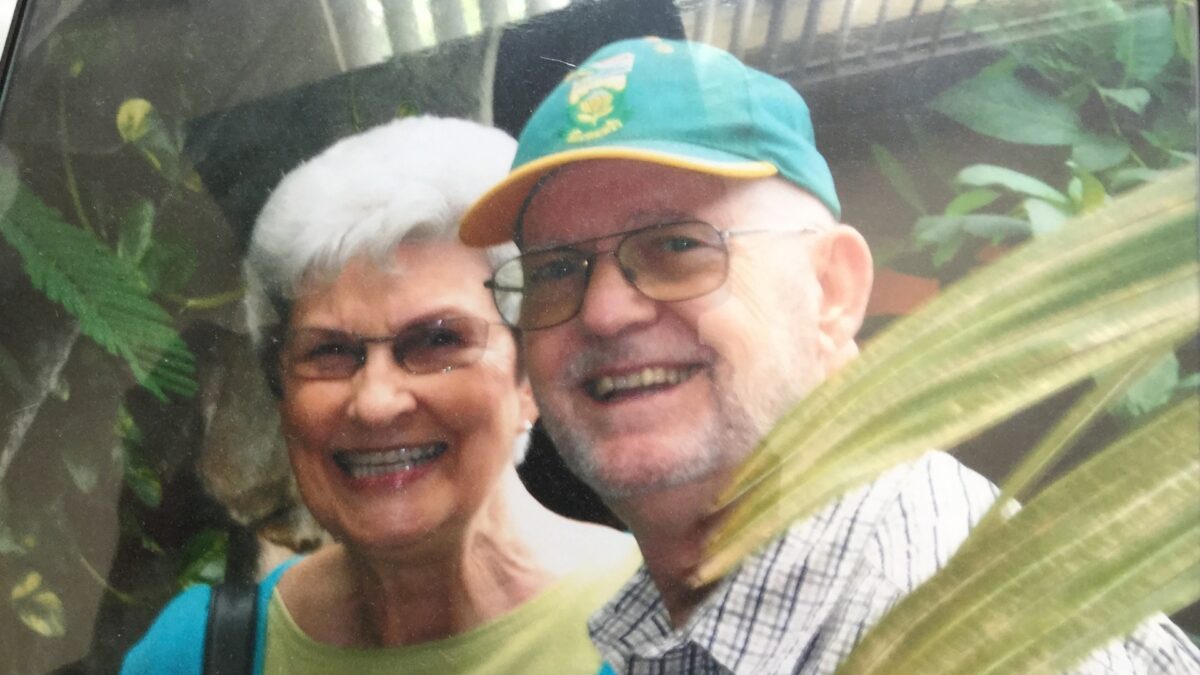Heroes of the Faith | Lonnie & Georgine Brooks

Only God could bring two lives together with contrasting backstories to spend their entire lives reaching souls around the world with the gospel.
Georgine Stonehocker grew up in a Christian home, accepting Christ as her Savior at a young age. At the age of 12, she surrendered her life to missions in Africa. Throughout her teen years, she was often found teaching children, but later under the influence of others, Georgine left her Utah home and entered Baptist Bible College to be trained in missions.
Serving God was of no interest to Lonnie Brooks as he typically avoided any mention of God’s love for him. After graduating high school in 1952, he took a job as a payroll clerk in a steel construction factory. With only three days on the job, he discovered he did not like sitting at a desk, so he went downtown and enlisted with the Air Force where he was very adept at intercepting Morse Code. Ironically, he was stationed in England during the Korean War where he sat at a desk for eight hours a day.
Redirected
It was while he was in London (1955) that the Billy Graham crusade came to London’s Harringay Arena with over 11,000 in attendance on the first night. This was Graham’s first crusade in Britain where nightly meetings were held for three months. Two million people heard the gospel over the course of the crusade and thousands were saved.
Lonnie read in the newspaper that people were going forward and giving their life to Christ. Lonnie’s family, who had made a profession of faith under the ministry of Dr. John Rawlings, had been praying for Lonnie.
But it was not until June 1956 after returning to the US when his military service was completed, that those prayers came to fruition when Lonnie agreed to go to a local revival and was saved on June 21, 1956.
Soon after, even though he was a young adult by now, he was allowed to go to youth camp where he felt God’s call and subsequent surrender to missions. In a few short months, he entered Baptist Bible College to receive training.
In March 1957, Lonnie and Georgine met on campus and she instantly knew God wanted them to go to Africa together. At the Mission Prayer Band (a group of students and faculty who met regularly to pray for missionaries), they quickly became friends and dated for ten weeks before they were married November 22, 1957 on campus. With only $100 they had received from Georgine’s parents, they were able to cover all their wedding expenses.
On Lonnie’s final day of class at BBC, he heard that the field in Ethiopia was wide open. Since his initial surrender to missions, he had intentions of going to the Philippines. But God began redirecting their steps as Lonnie heard the plea from Fred Donnelson and Glen Cain (from the Sudan Interior Mission) to come to Ethiopia where Emperor Haile Selassie was inviting missionaries to come and evangelize his country. When Lonnie surrendered to the call to Ethiopia, God affirmed in Georgine’s heart that her premonition about them going to Africa together would now be a reality and just the beginning of 46 years invested on the mission field.
As they worked for Dr. Rawlings for a year and a half as mission interns, they gained experience with street meetings and visitation, learning to teach and persevere, while gaining a love for organization and planning. Lonnie was quite timid by nature but by being given the evening class of adults to teach, God began to shape him for greater challenges ahead.
Delays
There was a delay in getting their final approval as career missionaries because Georgine needed one more class to complete all of the updated mission course requirements. Lonnie was permitted to begin deputation while Georgine lived on campus so she could complete her final class. There was only one catch – due to financial constraints, they had to leave their two young children in Ohio to be cared for by family and friends, but Georgine was allowed to bring their infant baby to class. At the time, the Brooks didn’t realize how valuable that class on Handbook of Health (taught by Fred Donnelson) would be. They just knew that whatever it took to get to Africa, they were willing to do what was necessary. In time they came to realize that God was in the delay as that specific class prepared her with medical skills she would need and use extensively on the field.
“Our approval as BBFI missionaries was one of the happiest days of our lives.” Lonnie Brooks
Arrival
Upon their arrival in Ethiopia on May 5, 1962, the first order was to attend language school. Then they, along with their three children under the age of five, moved to their first mission station in Haik, where a work had already been launched by an Ethiopian convert of Glen Cain. With 94% of Ethiopians being illiterate, Lonnie and Georgine were to fulfill their responsibility to the government to open a school in the area. Before the end of their first term, a medical clinic was also opened by Mr. Cain’s daughter, Naomi.
Located on 2.5 acres, they lived in the three-room, 270 sq. ft. house which had been built by Richard Konnerup and Glen Cain. Even with no refrigerator, no running water, no electricity and only a camping stove for cooking, God still supplied every need, big or small. Water had to be brought from the river and boiled for 30 minutes (which gave off quite the odor during the process) then strained before it could be used.
But even more difficult was their existence without a car, and without having a means of communication other than walking three miles away to the nearest telephone. To retrieve their mail, it was necessary for Lonnie to wait for hours alongside the road until a bus would come by that would take him 18 miles to the town of Dessie. Occasionally, the bus passed him up because he took up more space on the bus than three Ethiopians would.
However, the Brooks enjoyed living in Haik which was at 7,700’ elevation, where there was beautiful weather year-round and no threat of malaria. Church visitation was conducted up and down the hills on foot or later by using two horses due to the conditions of the road.
Many were saved and baptized during their ministry in Haik, but when Lonnie and Georgine could no longer get peace with leaving their children at boarding school, they felt God leading them to move to Addis Ababa to continue their ministry while being closer to their children. There they remained until the Revolution in 1974 which forced them to leave the country in July 1975.
Transitions
After a few months in Costa Rica, where they considered permanently planting themselves into new works, they instead felt led to transition to Kenya in January 1978. After completing yet another language school, they moved to Thika, being one of the first missionaries who had transitioned from Ethiopia to Kenya. In Thika, they began to instantly see great fruit as opposed to the two years it took to gain a convert in Ethiopia.
At the end of their first term, they attended a funeral in the Kisumu district which required many long, hard hours of travel to get there. People had heard they were coming and they began to come as soon as the Brooks arrived, wanting to hear the gospel.
During their second and third terms on the field, God opened the door for ministry in both the Kisumu and Kisii districts. Using several dynamic tools to tell the gospel, like the films ‘Jesus’ and ‘Peace Child’, they saw hundreds of people saved. Twenty-three preaching points were established as many begged them to come to their village to tell their people. Reaching many from the Luo and Kisii tribes, several were trained in the Bible school where both Lonnie and Georgine taught. Georgine taught them the songs, how to conduct Sunday Schools and Vacation Bible Schools, and how to make their own teaching materials to use. Later, a preschool and elementary was started where she stayed quite busy teaching reading and nutrition as well as serving as the principal. Again, all their teaching materials were made by hand.
When Lonnie’s need for heart surgery arose in 1996, it became necessary to leave Kenya, which they did in 1998. Immediately, they began seeking God on how He could still use them in missions. Conversations with Mission Director Bob Baird, led to the formation of a new program called SMORS (Skilled Missionaries Offering Relief Services). Lonnie and Georgine would be the first SMORS missionaries to fill the need to shepherd established works while a missionary needed to take time away for furlough or to attend to emergencies, often for up to eight months at a time.
Beginning in Malta, their relief services took them to Korea, (which opened up a side trip to China), Scotland, South Africa (four times), Australia (which opened a side trip to New Zealand), Jamaica, and Belgium. They made it a practice as SMORS missionaries to pay their own way to the field, live in the missionary’s home, drive their car, and follow established routines to keep the ministry running as smoothly as possible while the host missionary was away. At times, the Brooks stayed even longer than planned to enable the missionary they were relieving to finish out their furlough as needed.
Many enjoyable memories and relationships were created while they served in various countries. While in Malta, a Chinese lady and her son came to the church to learn English so she could take him to America to receive medical treatment. But as the mercy of God would have it, the son was saved, then his mother. Soon thereafter, while serving in Korea, the Brooks took a side trip into China at the request and personal arrangements made by the son, in order that they could witness to the father. Lonnie was able to meet with the father as well as a brother-in-law face-to-face and lead them and one other to Christ for salvation. Time and again, the Brooks saw God put them exactly where He wanted them in order to meet a hearer who was ready to hear the precious words of life and be saved.
Challenges
When asked what circumstances proved to be particularly challenging during their ministry, Lonnie described the time when they were falsely accused while their only intention was to help. The conclusion of the matter was to trust God with the situation knowing that He knew their heart and motives.
Georgine told of a time when they first arrived in Ethiopia and did not yet have a car. She had to stay home in the mission station at Haik with their three children while Lonnie needed to make a trip to Addis. They agreed on a certain date that he would be back. But three days after the date he was expected to arrive back, out of desperation she walked three miles with their oldest child who was five years old at the time to use the telephone, leaving their two daughters, ages three and one, with a Muslim worker at the house. She was able to learn over the phone that Lonnie had come down with a bad case of strep but would return home as soon as possible.
Then there was another particularly hard day when she received a letter from family which had been mailed two weeks earlier. Her mom had passed away and the funeral was being held the very day she received the letter. Ethiopians who were with her that day grieved with her, but since she did not sorrow as those without hope, she was able to witness to them about the hope she had in Jesus Christ. Mama Wuletu asked Jesus to save her, and Georgine’s tears were changed to JOY.

Advice
When asked what they would tell younger missionaries about how to endure through times that would prove to be especially hard, Lonnie replied, “Stay in the Word and be consistent in prayer.” Georgine added (when referring to their relationship) – “Remember God is in control regardless of the situation and, at the end of the day, I know God loves me and I love him. God will turn any bad situation into good.”
Lonnie’s favorite verse is Proverbs 11:30 “The fruit of the righteous is a tree of life; and he that winneth souls is wise.” With Georgine’s favorite verses being: Psalm 32:8 “I will instruct thee and teach thee in the way which thou shalt go: I will guide thee with mine eye.” And Psalm 56:9 “When I cry unto thee, then shall mine enemies turn back: this I know; for God is for me.”
With the salvation of many souls being attributed to the work of Lonnie and Georgine Brooks, God undoubtedly considers them to be wise indeed.









